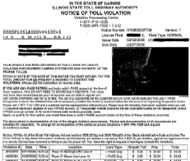1/7/2008
Illinois: Toll Road Imposes Hefty Bills, No Real AppealsMotorists in Illinois have little ability to challenge massive fines imposed on the state tolling authority.

Motorists wrongly accused of skipping payments on Illinois toll roads face thousands of dollars without a realistic opportunity to challenge the charges before an impartial hearing. In a multi-part expose, the suburban Chicago Daily Herald newspaper detailed the plight of motorists accused by state agencies of cheating the system. Last year, 26,282 vehicle registrations and 8055 driver's licenses were suspended over toll skipping allegations. Toll skipping is big business, generating $46 million in violation bills since July 2006.
Innocent motorists often receive these bills as tollway violation cameras are unable to distinguish various specialty license plates available in the state. There is no penalty for a violation contractor when it guesses the wrong plate number. This same problem has led to false accusations of cheating in other parts of the country as well.
Whether or not the initial accusation is accurate, the system often sends violation notifications to the wrong address because it uses the vehicle registration database instead of the driver's license registry which is considered more up-to-date. A motorist who would have paid up immediately if informed of the problem has no recourse if the notification was never sent or never received.
Leslie Boudreau found this out the hard way. She told the Daily Herald that she was a regular I-PASS user for several years. When her credit card failed to replenish her I-PASS account last year, she unknowingly failed to pay $179.50 for dozens of trips to work. She never knew about the credit card problem because the tollway failed to send notice to any motorists between July 2006 and August 2007 as it switched toll collection contractors. This delay allowed late fees and penalties to grow.
On September 25, the tollway demanded Boudreau make payment in full of $4619.50 within 14 days. Boudreau refused, filing an appeal to the circuit court. The tollway quickly reversed its position and offered a settlement -- she could get off the hook if she paid just $679.50. Had she refused this deal and lost the appeal, the agency could have forced her to pay $15,739.50.
Failure to pay the fines within defined time periods -- regardless of notice -- escalates both the financial penalties and results in license and vehicle registration suspensions. The tollway's appeals process is designed to prevent the overturning of its decisions. The hearings are conducted by an attorney paid $50 an hour by the tollway to decide whether it is "more likely than not" that a motorist is guilty. Under this civil procedure, the tollway prohibits the hearing officer from considering whether the motorist ever received notification of the alleged offense or whether the toll road's violation detection may have malfunctioned.
The only realistic defenses allowed are: "respondent was not the registered owner of the vehicle in question at the time of the violations; or respondent has already paid all of the fines and penalties in full."
Appealing the ruling of a tollway hearing to a circuit court costs $247 in "fees" that are not refunded even if the motorist is found innocent.


